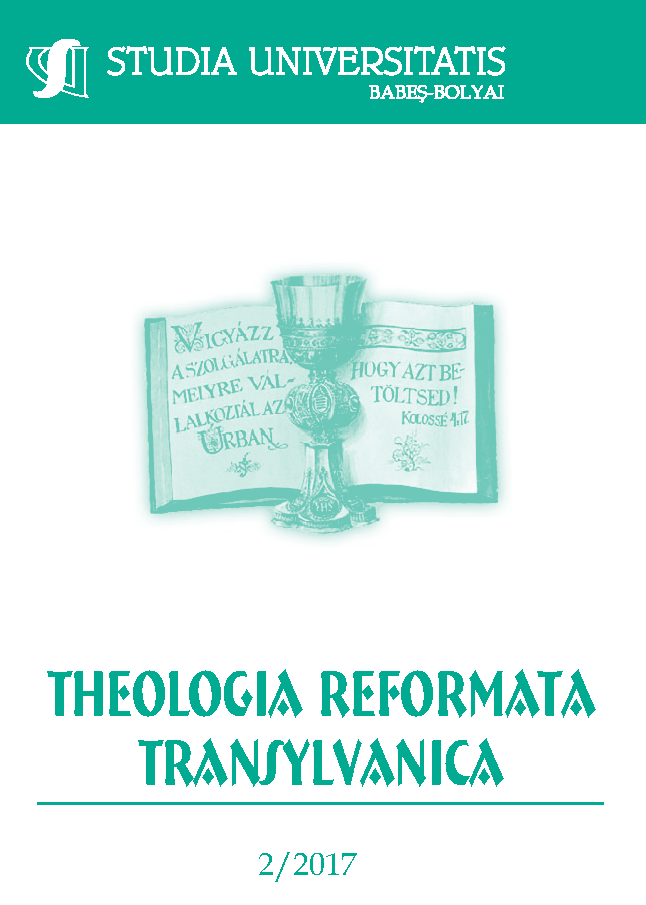Seelsorge als Denkdiakonie. Reformatorisches Erbe in der heutigen Seelsorge
DOI:
https://doi.org/10.24193/subbtref.62.2.14Keywords:
kerygmatic pastoral care, psychological diaconia, the truth of faith, cognitive psychology, conviction, “credition”.Abstract
Pastoral Counseling as Deaconry. Reformed Direction in Contemporary Pastoral Care.
The basic assumption of this article is that the (pastoral) care giver must provide not only psychological support to those in need in their difficult life situations, but in addition to that she/he should give assistance to find meaning of the psychic reactions befallen under the given circumstances and contextual effects. Care giving in believing aims both to raise trust in God and to help evaluating the situation ac-cording to the truth of God. The Reformed tradition emphasized the cognitive aspect of faith with the same strength as well as the affective aspect, the “wholehearted trust”. The latest pastoral care almost leaves out of eyesight the content of faith and does not endeavor to change the conviction of the client. As if it would go along with the demand of truth-plurality of the postmodern world. Although there is no theological, nor psychological reason to do so. From theological point of view, we should perceive faith both as an affective commitment, also a novel cognitive process reflection upon ourselves, others and the world through the lenses of God’s truth. From psychological view we can say that we evaluate and shape our inner and outer positions of our lives according to our basic convictions. The aim of pastoral care would be to help the clients to turn the basic convictions of hopelessness into real faith contents (credition), that radically change their perceiving and living through the different situations. By this approach could become the pastoral care a helping device of nurturing thinking faith that is in accord with the Reformed tradition and the truths of God’s Word.
References
ANGEL, Ferdinand: Ist das Konzept der Creditionen für die Religionspsychologie brauchbar? In: Wege zum Menschen, 2011/1. 4–26.
CALVIN, Johannes: Institutio Christianae Religionis. Unterricht in der christlichen Religion. Übers. von Otto Weber, Neukirchen, Neukirchener Verlag, 1955.
DANZ, Christian: Einführung in die evangelische Dogmatik. Darmstadt, Wissenschaftliche Buchgesellschaft, 2010.
ELLIS, Albert: Grundlagen und Methoden der Rational-Emotiven Verhaltenstherapie. München, Pfeiffer, 1997.
EPSTEIN, Seymour: Cognitive-experiential Theory. An Integrative Theory of Personality. Oxford, Oxford University Press, 2014.
FEKETE Károly: A Heidelbergi Káté magyarázata. Hálaadásra vezető vigasztalás 129 kérdés-feleletben. Budapest, Kálvin Kiadó, 2015.
GRAWE, Klaus: Neuropsychotherapie. Göttingen etc. Hogrefe, 2004.
*** Heidelberger Katechismus. Revidierte Ausgabe 1997, Herausgegeben von der Evangelisch-reformierten Kirche (Synode ev.-ref. Kirchen in Bayern und Nord-westdeutschland), von der Lippischen Landeskirche und vom Reformierten Bund.
HÄRLE, Wilfried: Dogmatik. Berlin – New York, W. de Gruyter, 1995.
MÓROTZ Kenéz – PERCZEL–FORINTOS Dóra (szerk.): Kognitív viselkedésterápia. Budapest, Medicina, 2005.
NEISSER, Ulrich: Megismerés és valóság. Budapest, Gondolat,1984.
PIAGET, Jean: Szimbólumképzés a gyermekkorban. Budapest, Paulus Hungarus/Kairosz, o. J.
PÖHLMANN, Horst Georg: Apologetik (Art.). In: Erwin Fahlbusch et al. (Hrsg.): Evangelisches Kirchenlexikon (EKL), Bd. I. Göttingen, Vandenhoeck & Rup-recht, 1986.
RATSCHOW, Carl Heinz: Christentum als denkende Religion. In: Carl Heinz RATSCHOW: Von den Wandlungen Gottes. Beiträge zur systematischen Theologie (Hg. Christa Keller-Wentorf – Martin Rapp), Berlin – New York, Walter de Gruyter, 1986.
SEILS, Martin: Glaube (HST 13). Gütersloh, Gütersloher Verlagshaus, 1996.
STOLLBERG, Dietrich: Wahrnehmen und Annehmen. Seelsorge in Theorie und Praxis. Gütersloh, Gütersloher Verlagshaus, 1978.
TACKE, Helmut: Glaubenshilfe als Lebenshilfe. Neukirchen-Vluyn, Neukirchener, 1979.
THURNEYSEN, Eduard: Die Lehre von der Seelsorge. München, Kaiser, 1948.
THURNEYSEN, Eduard: Seelsorge im Vollzug. Zürich, EVZ-Verlag, 1968.
WINKLER, Klaus: Das persönlichkeitsspezifische Credo. In: Wege zum Menschen, 1982/4. 159–163
Downloads
Published
How to Cite
Issue
Section
License
Copyright (c) 2017 Studia Universitatis Babeș-Bolyai Theologia Reformata Transylvanica

This work is licensed under a Creative Commons Attribution-NonCommercial-NoDerivatives 4.0 International License.



